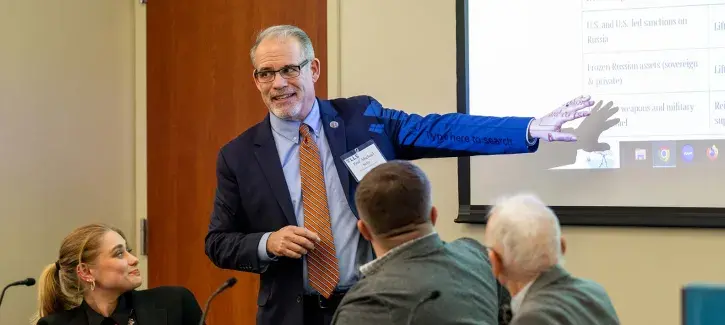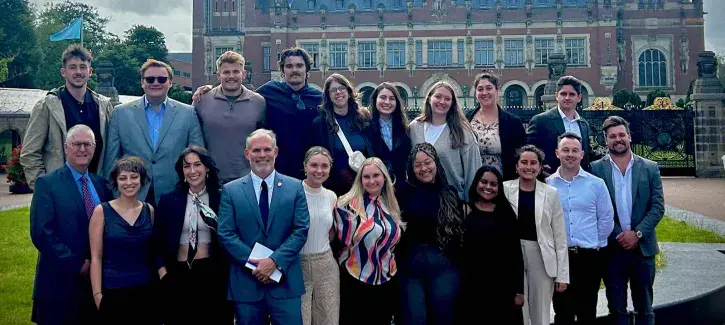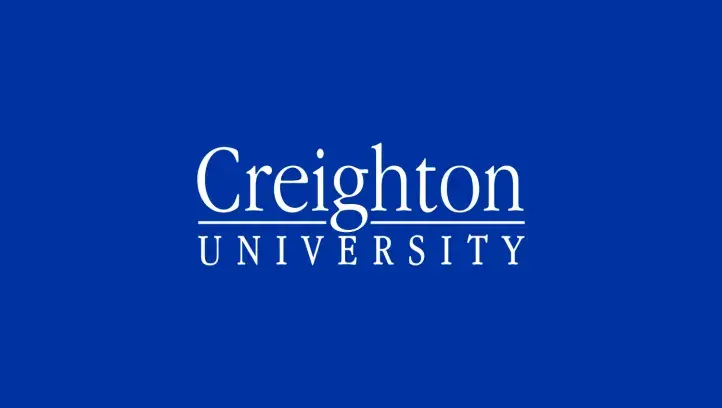
Bringing Creighton’s mission to Ukraine and back again

Sometimes “living the mission” means advocating in print, in person or in the classroom for what’s right. Sometimes this is in the comfort of Omaha, sometimes it’s in the discomfort of a war zone. I’ve done both.
Our Jesuit social justice mission calls on us to defend human rights wherever they are in jeopardy and to insist upon accountability wherever atrocities are committed. As Creighton’s international law professor, fulfilling these twin pillars of our shared purpose sends me around the world in unexpected ways.
Over the span of two and half decades — through twists and turns in global political leadership, ideologies and multilateral and bilateral relations — I’ve found myself:
- conducting field research on the northern Iraqi border with Iran, investigating the 1988 Kurdish genocide and then traveling back to Iraq’s regional capital, sitting next to a Jesuit, helping draft their constitution;
- representing the U.S. in sequential congresses of l’Association Internationale de Droit Pénal, the oldest association of criminal law specialists in the world;
- meeting with Pope Francis at the Apostolic Palace in the Vatican about corporate responsibility for human rights abuses;
- testifying before Congress on retention of America’s embargo against Cuba after the fall of Castro;
- addressing the United Nations in New York and Tokyo;
- working on internet human rights in Bali, Dublin, Hyderabad, London, Washington, D.C., and San Francisco;
- and, most recently, standing with Ukraine against Russian aggression.
The Road to Ukraine
The road I’ve traveled in pursuit of justice for Ukraine began when I published a white paper with colleagues from Oxford, Stanford, Harvard and Cleveland State, laying out the legal framework to prosecute Russian corporations for war crimes in Ukraine and to then use those judgments to seize their frozen assets in Western capitals.
The call quickly came for me to join a delegation from the American Society of International Law that was going to Ukraine on Dec. 10, 2023, to commemorate the 75th anniversary of the Universal Declaration of Human Rights, which was adopted by the United Nations in Paris on that date in 1948.
Doffing a new insulated cap with ear guards, given to me by my wife for the freezing cold, I set off for Warsaw to rally with the rest of my group, be briefed by a British security team, which was accompanying us, and join a convoy of three buses heading southeast across the barren steppes to Ukraine.
After waiting at the border behind phalanxes of Red Cross trucks bearing medical supplies, we were received by Ukrainian national police who whisked us under escort to Lviv, about 250 miles west of Kyiv. Over the next three days, we engaged in a bilateral summit with the Ukrainian Association of International Law, discussing how to handle Russian prisoners of war, measuring physical damage assessments the war had inflicted, reviewing the preservation of cultural and religious heritage, and developing legal strategies for prosecuting the war before international tribunals and securing frozen Russian assets to begin rebuilding the country.
The mayor embraced us, taking us to the city hospital, refurbished with American financial assistance and renamed “Unbroken,” that was transformed into a prosthetic limb production, fitting and rehabilitation center for wounded soldiers and citizens. A special wing was added for the many children who, surviving Russian bomb blasts, were missing limbs and oftentimes parents. Heartbreaking to see, we learned much. For example, psychiatric specialists from Doctors Without Borders were seeing children during refitting. An 8-year-old girl who loses a leg must receive a new prosthetic leg each year until she stops growing at 18. Each new fitting can retraumatize her. So now therapists are on the frontlines to deal with this dynamic alongside the doctors and nurses.
Human Rights Day in a Storied Hall
On Human Rights Day, we gathered in the vast wood-paneled lecture hall of the law school at Ivan Franko National University under a crenelated glass rotunda that was wrapped in quilted tarps to shield it from flying debris Russian bombs and drones ejected from nearby explosions. Centuries old statues and stained glass were similarly draped in churches and museums across the city.
That hall and that school held tremendous symbolic value. Over 100 years earlier, when the city was known as Lemberg (part of the old Austro-Hungarian Empire), Hersch Lauterpacht went to law school there. Several years later, so did Raphael Lemkin. Lauterpacht created the concept of Crimes Against Humanity, which was later charged against Nazi leaders at Nuremberg. Lemkin crafted the concept of genocide (from the Ancient Greek genos, meaning “group of people,” and the Latin cide, meaning “act of killing”) to describe what was happening to Jews in Poland. These young East European Jews never met but took the same professor for criminal law and gifted the world frameworks of international justice that we still use today in The Hague.

The remarkable legacy of that lecture hall was tarnished in 1942 when Hans Frank, Hitler’s governor-general of Poland, rose on the venerable dais to deliver a “Final Solution” speech calling for the liquidation of the Jews. As he spoke, the Janowska concentration camp on the outskirts of the city was already collecting and exterminating its quarry. Frank received justice at the Nuremberg war crimes trials, but a pall remained over that room during Soviet times, until Ukrainians, under siege from Russians, joined hands with Americans on that cold December day to celebrate the human rights milestone.
Former Secretary of State Hillary Clinton, who underwrote our trip through the Clinton Foundation, joined us via satellite to emphasize the importance of why we were there. Our group was presented with a battle flag signed by the soldiers of a Ukrainian artillery battalion on the Eastern front and sent all the way back to us in appreciation and solidarity.
Interrupted by Air Raid Sirens
As the former dean of Yale Law School was finishing his closing speech, air raid sirens began to wail in response to the launch of a Russian Mig-23. Instantly our phones leapt into service, having been outfitted with apps tied to the national air defense system; maps popped up directing us to the nearest shelter.
Had the Russians known of our gathering, they no doubt would have targeted 150 Ukrainian and American attorneys hosted by President Volodymyr Zelenskyy’s international justice ambassador, Anton Korynevych — who had just scored a major victory against Russia at the International Court of Justice and helped guide the arrest warrant issued against Vladimir Putin from the International Criminal Court.
Undeterred, the dean finished his speech after the sirens subsided. In fact, “undeterred” was the theme we left Ukraine with that wintry day. The snow was up to our knees and the cold was biting — emblematic of the Russian winters that had famously stopped the advances of both Napoleon’s and Hitler’s armies. But we left hopeful that human rights had been fortified and that justice might be secured.
Blazing a Trail with Environmental Crimes
Ten months later, I was called back into service to join a team of five American law professors tasked with training 25 Ukrainian prosecutors and several Supreme Court judges on how to build environmental crimes cases against Russian commanders and soldiers and bring those cases forth as war crimes or ecocide under Ukrainian law.
Since the Russian invasion of 2022, Ukrainian civilians had been slaughtered en masse, thousands of children had been stolen and abducted into Russia, torture centers were created and cities bombed. These are classic war crimes that attorneys and judges are used to handling. But Russia’s armies, navies and mercenaries also had wrought havoc on Ukraine’s natural resources and environment, and President Zelenskyy wanted them to account for that destruction in particular, but the legal system had little precedence.
Sponsored by the International Bar Association based in London, we gathered this time in Rzeszów, on the Polish side of the Ukrainian border, and waited for our “class” to arrive and spend a week with us learning about this newly developing area of law.
In the course of our time together, we worked to define elements of these crimes in many of the Russian military actions from blowing up the Kakhovka Dam — flooding the surrounding countryside, wiping out villages and forests, and draining the reservoir behind it — to purposely setting fire to protected woodlands; poisoning rivers and streams; bombing the Zaporizhzhia nuclear power plant; leaving tons of unexploded ordinance across thousands of acres of sunflower and wheat fields; and killing Black Sea dolphins in Ukrainian waters with Russian submarine sonar blasts. The judges and deputy prosecutor general who accompanied the group were especially thankful for our training and pledged to do their best with the legal tools we had provided.
Embracing the Fight for Human Rights and Justice
Back in Omaha, Creighton law students dig into my field work and use it to enrich their discussions in class. As part of our summer abroad program in Nuremberg, studying the Nazi war crimes trials and the Holocaust, I bring them to Krakow for several days to explore the World War II crime scene of Auschwitz.
We set aside an afternoon for them to visit with Ukrainian refugees and attorneys, who come to talk about the war that’s still being fought less than 500 miles from where they’re sitting. The past meets the present for them in this way, just as it did for me in that Lviv lecture hall. Capturing it, turning it to the light and inspiring this next generation of attorneys to go into the future emboldened by mission and fueled with purpose to help deliver justice wherever they can is good work. Very good work.
It’s the work that the late Creighton law alumnus Ron Delaney, JD’30, undertook when he moved his family to Tokyo in 1947 to prosecute the fallen Japanese prime minister Hideki Tojo before the Tokyo War Crimes Tribunal. It’s the work that the Hon. Charles Smith, JD’70, is doing today in The Hague as presiding judge of the Kosovo tribunal trying the case of their fallen prime minister for crimes committed at the end of the Balkan civil wars.
Creighton’s School of Law has been part of the fabric of international criminal law from the beginning, and we remain part of it today. Among countless Bluejays working toward international justice in countless ways, our students have assisted on the Guantanamo Bay terrorist trials, fought human trafficking for the Justice Department, taken on stolen property cases in Cuba for the Treasury Department, and had a hand in returning abducted children for the Senate Judiciary Committee.
Inspiring beyond measure, our students are “setting the world on fire” for human rights and justice, and I’m committed to keeping that flame going as long as I can.
Editor’s Note: Michael Kelly, JD, LLM, continues to follow the events as they unfold in Ukraine.
Gift Establishes New Center at Law School
A $2 million gift to the School of Law will endow a groundbreaking program and create a new center. Both will expose generations of law students to the realities of the Holocaust and the international criminal courts seeking justice for the victims of atrocities today. Read more about the gift made by Donna Gilbert and her children, Dave and Stacey Gilbert, that endows the Howard A. Kaiman “Nuremberg to The Hague” Summer Abroad Program and establishes the Samuel and Ida Kaiman Center for International Criminal Justice and Holocaust Studies.




